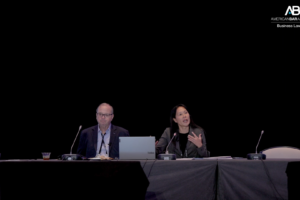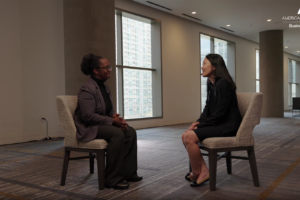CURRENT MONTH (September 2023)
Delaware Court of Chancery Grants Summary Judgment Motion to Bumble, Inc. Upholding the Company’s High/Low “Identity-Based” Voting Structure
Colon v. Bumble, C.A. No. 2022-0824-JTL (Del. Ch. Sept. 12, 2023)
By Pamela L. Millard, Potter Anderson & Corroon LLP
In an opinion granting defendants’ motion for summary judgment, the Delaware Court of Chancery upheld the validity of a “high/low” voting structure reflected in the certificate of incorporation of Bumble, Inc. (“Bumble” or the “Company”). The Court rejected plaintiff’s claims that the post-IPO voting structure violated the Delaware General Corporation Law (the “DGCL”) by granting voting rights to two holders of the Company’s Class A common stock that were greater than voting rights given to the other holders of Class A common.
In 2021, Bumble went public utilizing an “Up-C” IPO and a dual class voting structure. In a typical dual class structure, Class A common shares receive one vote per share and are issued to public stockholders, while shares of Class B common receive ten votes per share and are issued to company insiders. Bumble’s certificate of incorporation replicated this structure, authorizing Class A and Class B common stock, with the Class B stock limited to voting rights only.
In allocating the voting rights of the Class A and Class B common, however, Bumble’s certificate of incorporation provided that each share of Class A common would receive one vote per share, other than shares held by a “Principal Stockholder,” which received ten votes per share. The certificate of incorporation designated two Principal Stockholders by making reference to a separate and publicly disclosed stockholders agreement: Whitney Wolf Herd, Bumble’s founder, and Blackstone, Inc., the Company’s largest financial sponsor.
In addition to providing for differential “high/low” voting rights for the holders of Class A common, the Company also issued only two shares of Class B common stock—one to Herd and the other to Blackstone. The combined effect of the post-IPO Class A and Class B governance structure based on the Company’s most recent proxy statement gave Herd and Blackstone the collective ability to exercise 92.2% of the Company’s outstanding voting power.
In 2022, plaintiff filed suit claiming that the combined effect of the Class A and Class B common voting structure (the “Voting Structure”), including the alleged “identity-based voting” provision granted to the Principal Stockholders, violated Sections 212 and 151 of the DGCL. Plaintiff and defendants subsequently filed cross-motions for summary judgment.
In analyzing plaintiff’s claims, the Court first cited Section 102(a)(4) of the DGCL, which expressly permits a corporation to authorize “special attributes” that a class or series of stock may possess. The Court noted that such special attributes may include superior as well as inferior voting rights set forth in a certificate of incorporation or in a certificate of designations.
The Court then cited default language contained in Section 212(a) of the DGCL stating that, if the certificate of incorporation is otherwise silent, each share of stock is entitled to one vote. The Court reasoned, therefore, that Section 212 “both provides for a default right of one vote per share and acknowledges that the charter can specify a different number of votes per share” unless otherwise provided in the certificate of incorporation.
The Court also engaged in a detailed analysis of Delaware case law interpreting Section 212 of the DGCL, including the Delaware Supreme Court’s opinion in Providence & Worcester Co. v. Baker, 378 A.2d 121 (Del. 1977). Noting that the Delaware courts have on several occasions upheld charter provisions that allocate voting power using a formula or procedure, including voting power that turns on the identity of the owner of the shares, the Court concluded that the Voting Structure did not violate Section 212(a) of the DGCL.
Turning to plaintiff’s claim that the Voting Structure violated Section 151(a) of the DGCL, the Court observed that Section 151(a) also permits special attributes, including superior or inferior voting rights, to depend on facts ascertainable outside of the certificate of incorporation. Section 151(a) also defines the term “facts” broadly as including, but not limited to, “the occurrence of any event, including a determination or action by any person or body, including the corporation.” See 8 Del. C. § 151(a).
In concluding that the Voting Structure also did not violate Section 151(a) of the DGCL, the Court determined that nothing in Section 151(a) prohibits “a provision that creates a closed set of holders who can exercise certain rights” using facts ascertainable outside of the certificate of incorporation.
Summarizing its statutory analysis, the Court held that the Voting Structure complied with the DGCL since:
- In accordance with Sections 102(a)(4) and 151(a), the certificate of incorporation “sets out a formula that applies to all the shares in the class and that specifies how voting power is calculated”; and
- In accordance with Section 151(a), the formula makes the “quantum of voting power” that a share carries dependent on facts ascertainable outside of the certificate of incorporation, in this instance the identity of the owner, which includes the two Principal Stockholders.
Importantly, in granting defendants’ motion, the Court cited the “twice tested” rule pursuant to which actions are analyzed “once for legal compliance and again in equity.” Noting that plaintiff elected only to test the legal validity of the Voting Structure, the Court did not reach the issue of whether a similar identity-based governance structure could be deemed inequitable.
Delaware Court of Chancery Substantially Upholds Damages Calculation in Pharmaceutical Manufacturing Breach
AbbVie Endocrine Inc. v. Takeda Pharmaceutical Company Limited, C.A. No. 2020-0953-SG (Del. Ch. September 5, 2023) (Glasscock, V.C.)
By Timea Soos
On September 5, 2023, in AbbVie Endocrine Inc. v. Takeda Pharmaceutical Company Limited, the Delaware Court of Chancery addressed the quantum of cognizable damages in long-standing litigation arising from a breach of contract action filed by pharmaceutical company AbbVie against Takeda, a producer of pharmaceutical drugs, for failure to supply Lupron Depot, a drug used to treat cancer. In a memorandum opinion, Vice Chancellor Sam Glasscock III found AbbVie’s damages estimation methodology substantially reliable subject to adjustments.[1]
The Court, in its third memorandum opinion on the matter, addressed the calculation of damages after having previously found in AbbVie II that Takeda had breached the supply agreement, causing AbbVie to suffer lasting damage. Vice Chancellor Glasscock noted the judicial discretion afforded to courts while acknowledging “the inherent imprecision involved in crafting a remedy based on a hypothetical ‘but-for’ world in which no breach occurred.”[2]
The Court substantially adopted the damages model of economist Dr. Christine Meyer, AbbVie’s expert. Dr. Meyer’s model accounted for the three categories of Lupron applications: (1) in urology; (2) in pediatrics; and (3) in gynecology, and further divided urology and pediatrics into past and future damages. While Takeda’s economist, Dr. Michal Malkiewicz, provided grounds for diverging from AbbVie’s damages calculations including Takeda’s arguments on AbbVie’s failure to mitigate damages by not stockpiling Lupron, Takeda fundamentally adopted AbbVie’s model.
The Court held AbbVie was entitled to expectation damages in addition to pre- and post-judgment interest, but only entitled to some incidental damages, not the entire amount sought. The Court did not specify an exact final damages figure.
Timea Soos is a Law Clerk to the Honorable Judge Vivian Medinilla in the Complex Commercial Litigation Division of the Delaware Superior Court. She clerked as an ABA BLS Diversity Clerk to Justice Tamika Montgomery-Reeves at the Delaware Supreme Court and externed for Vice Chancellor Sam Glasscock III at the Delaware Court of Chancery.
AbbVie Endocrine Inc. v. Takeda Pharm. Co. Ltd., 2023 WL 5704055, at *6 (Del. Ch. Sept. 5, 2023) (“I find that the damages model employed by the parties is capable of producing a reliable, non-speculative estimation of damages. Accordingly, I adopt it.”) ↑
Id. at *3. (See, e.g., Agilent, 2010 WL 610725, at *24 (discussing the relationship between uncertainties and trial court discretion in the crafting of remedies)). ↑







